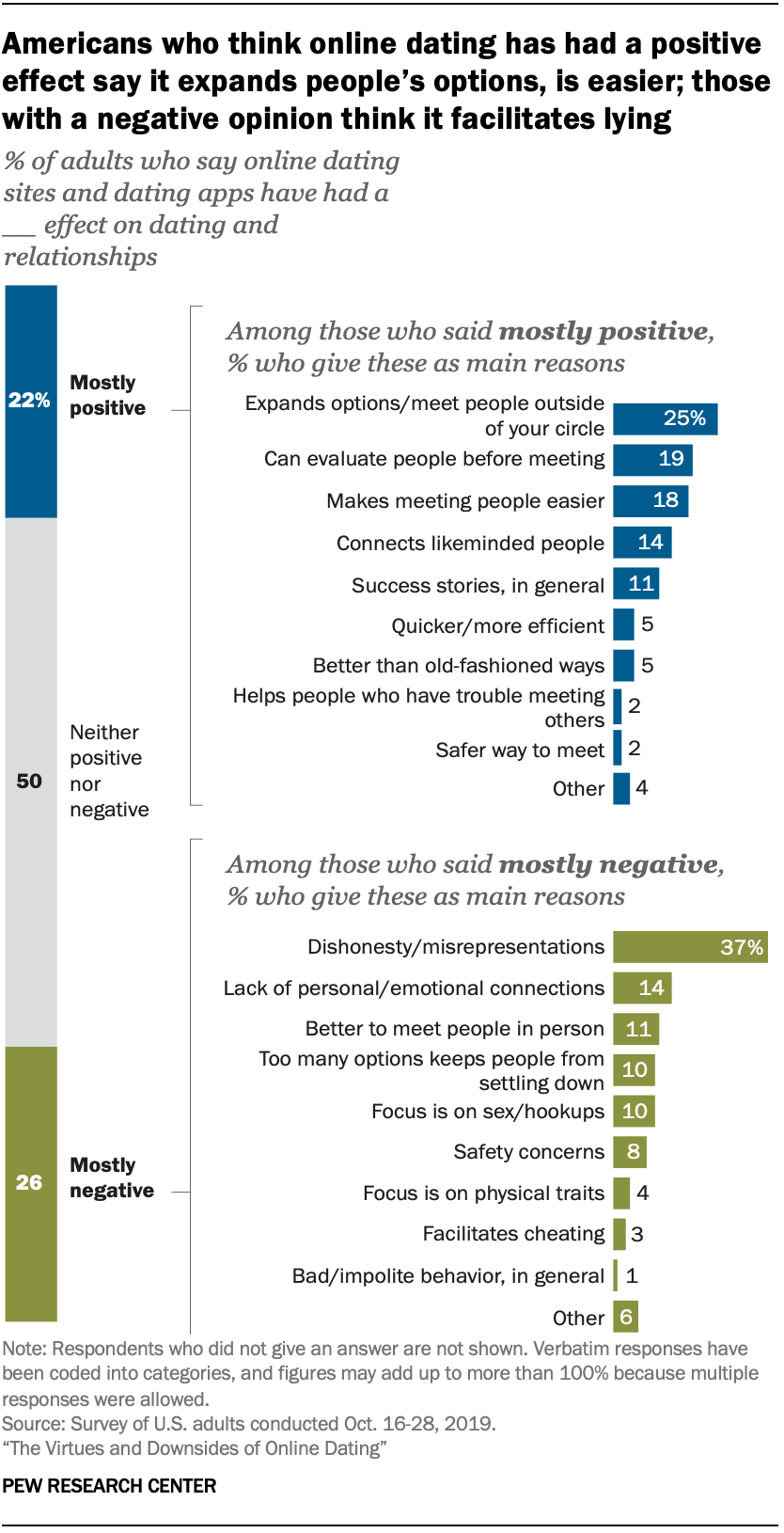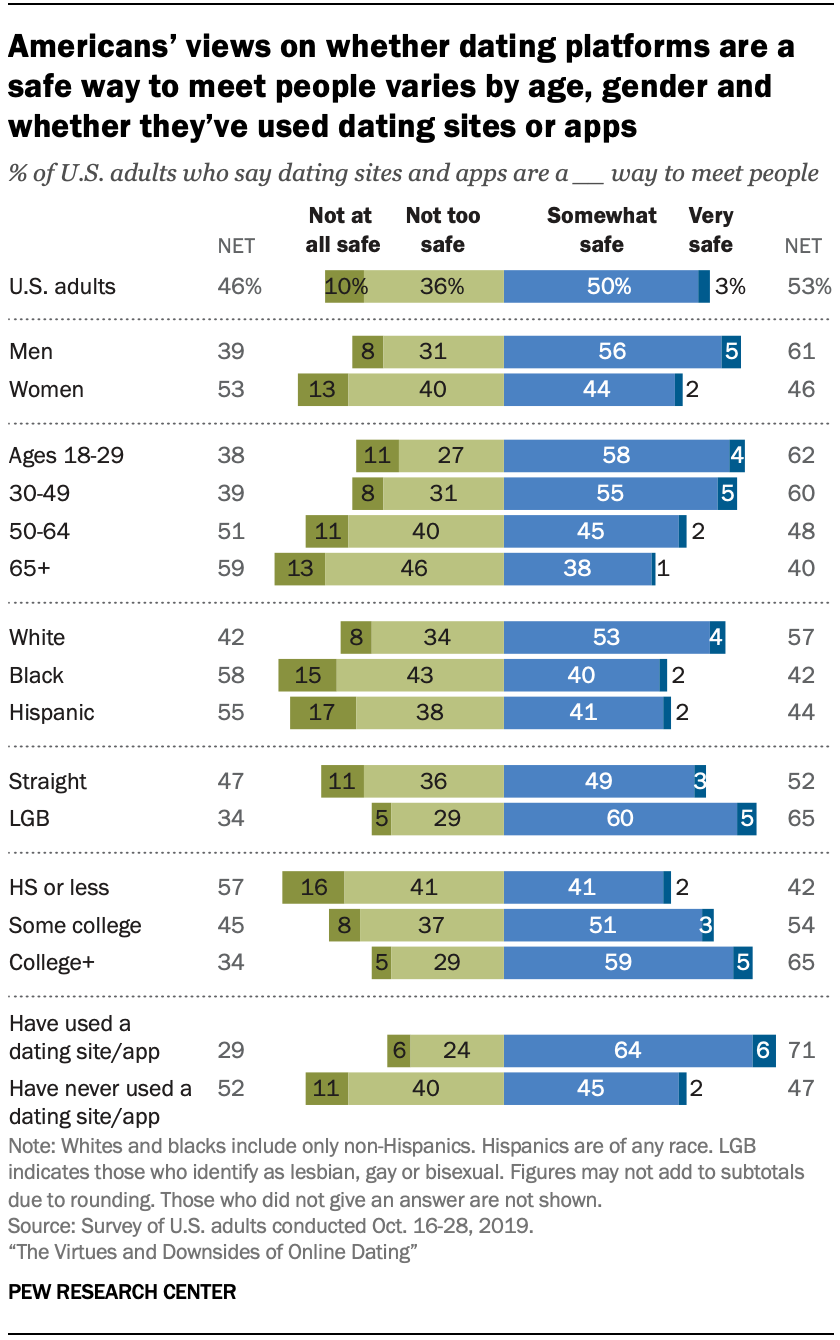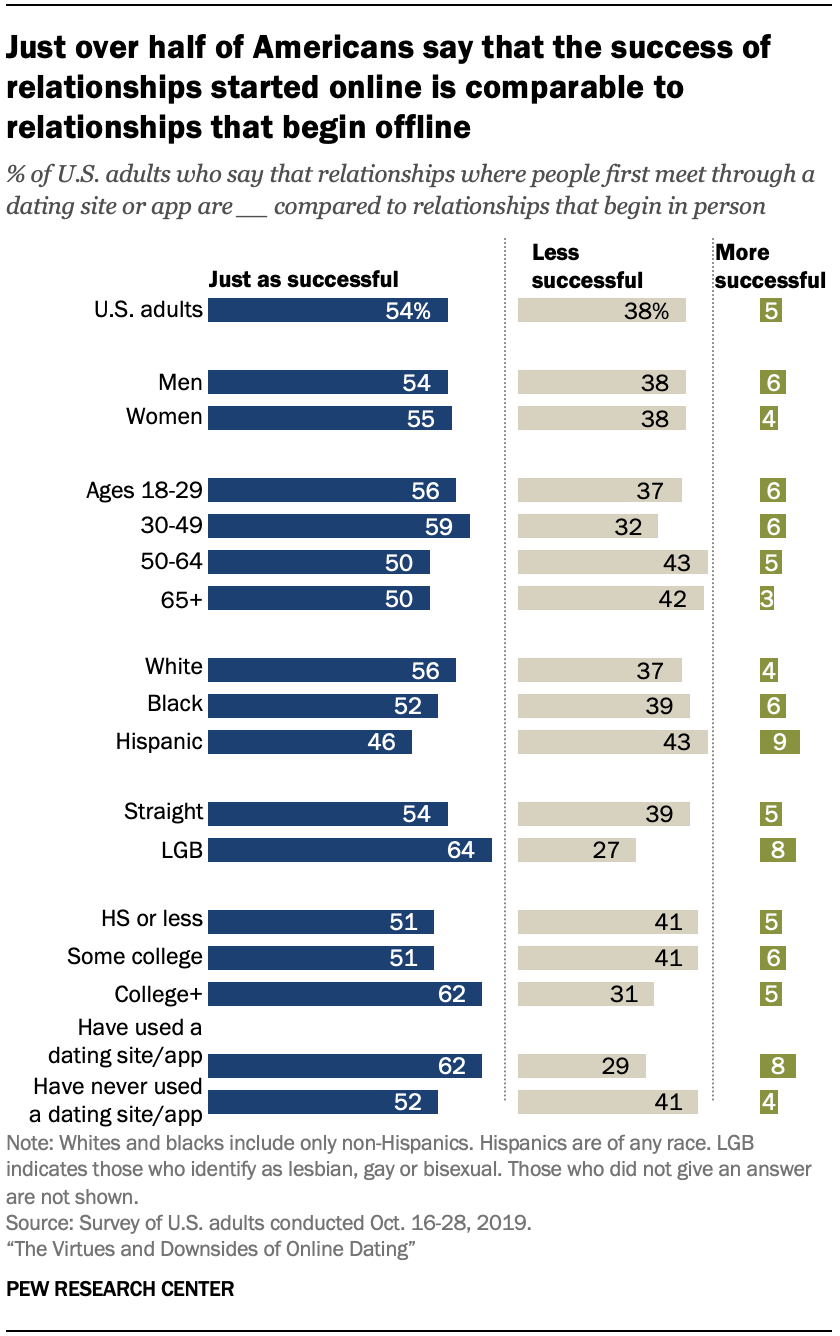Online dating platforms have been scrutinized at times for the way they have contributed to dating culture and its safety, as well as how successful they are at finding people a suitable match. There are a slew of both troubling and love stories involving online dating.
This chapter explores how all Americans – not just those who have online dated – feel about the broader landscape and impact of online dating. To begin, Americans are more likely to describe online dating as having a neutral impact on dating and relationships, rather than a mostly positive or negative one. And when asked to share their views about the success of relationships that begin through online dating, just over half of U.S. adults agree that these relationships are just as successful as those that began offline.
Still, views about online dating do vary across demographic groups, as well as by people’s own personal experience with using these sites or apps. At the same time, there are some lingering concerns about the danger of meeting someone through a dating site or app. Americans are somewhat divided on whether these platforms are a safe way to meet people.
Half of Americans believe that online dating has had neither a positive nor negative effect on dating and relationships

When asked to share their views on the type of effect dating sites and apps have had on dating and relationships, 50% of Americans believe their effect has been neither positive nor negative. Meanwhile, 26% say online dating has had a mostly negative effect on dating and relationships, while 22% describe its effect as mostly positive.
Across demographic groups, larger shares of Americans feel as if online dating has had neither a positive nor negative effect on dating and relationships, but personal experience with online dating also is associated with more positive views of its impact. Some 29% of online dating users view its effect on dating and relationships as mostly positive, compared with 21% of those who never used a dating site or app.
At the same time, 30% of adults with at least a bachelor’s degree say that dating sites and apps have a mostly positive effect on dating relationships, compared with 18% of those with a high school education or less. These educational differences are present regardless of online dating use.
Americans cite a number of reasons – ranging from expanding options to success stories – as reasons these platforms have been a good thing for dating and relationships
The survey also asked an open-ended question to give respondents a chance to explain, in their own words, why they feel as if dating sites and apps have had a mostly positive or mostly negative effect on dating and relationships.
Among respondents who say dating sites and apps have had a mostly positive effect, 25% say it is because they have helped expand people’s dating pool. Many of these responses emphasize how online dating has made it easier to meet people outside of one’s normal social circle, thereby expanding their options:
“They allow people who wouldn’t have ever really crossed paths in person easier access to that possible ‘one’ that they otherwise wouldn’t have ever met.” (Woman, age 36)
“It widens the pool of available persons.” (Woman, age 64)
Others in this group cite the ability to evaluate people before meeting them in person (19%) or that it is generally an easier way to meet people who also are interested in dating (18%).
“You read people’s profiles and know what they are all about before reaching out to them. Cheaper than going on a date to find out the hard way.” (Man, age 43)
“Easy to meet people. Easy to break the ice. Easy to size up people to see if you would like to really date them.” (Woman, age 28)
Some 14% of these respondents also express that these platforms can connect people who are likeminded or have mutual interests, while 11% offer up success stories as a reason online dating has had a mostly positive impact on dating.
“It’s easier to find someone who shares your interest and values. Easier to identify what you have in common before you decide to pursue spending time together.” (Man, age 54)
“We have known untold numbers of now-married couples who met online. … It does shrink the world to help you meet wonderful people.” (Woman, age 75)
Relatively small shares argue that online dating has had a mostly positive effect because it is a more efficient way of meeting people, is a better alternative to more traditional ways of meeting, helps people who have trouble meeting others or is a safer way of meeting people.
Americans who believe online dating has had a mostly negative effect on dating and relationships are especially likely to stress issues related to dishonesty
There is a stronger consensus among respondents who believe dating sites and apps have had a mostly negative effect. By far the most common response (given by 37% of these respondents) mentions that these platforms are a venue for various forms of dishonesty – ranging from people embellishing the truth to outright scams.
“You only know what they want you to know. They lie about themselves to make themselves look good.” (Man, age 58)
“People give a description of who they want to be and not always how they really are. You can’t depend on everyone being honest about who they are on both the positive and negative sides.” (Woman, age 40)
“I found there are a lot of scammers on dating sites trying to take advantage of others.” (Woman, age 59)
Another 14% in this group mention that online dating has made courtship more impersonal and devoid of meaningful communication.
“People don’t act like themselves online. No one is actually getting to really know each other. Communication is flawed from the beginning.” (Woman, age 33)
“There is a constant influx of ‘new inventory.’ It’s made dating more of a shopping activity (consumerism) than an interpersonal experience (emotional). The ‘swipe right’ mentality starts to affect us in everyday life.” (Man, age 56)
And additional 11% say the traditional ways of meeting were better and online dating has prevented people from connecting in the physical world. Overall, people who answer in this theme feel that online dating is generally just a bad way to meet people:
“Profiling isn’t romantic. The slower process of meeting someone, the chase, maybe the game and the face-to-face learning about each other makes for deeper and lasting feelings.” (Man, age 72)
“The old-fashioned way of meeting people in person or getting introduced through friends seems more individualized.” (Woman, age 30)
Respondents also offer other reasons they believe online dating has negatively affected dating, including that it keeps people from settling down because there are too many options (10% say this), while another 10% criticize these platforms for encouraging casual relationships and hookups. Another 8% in this group attribute their negative views of online dating to safety concerns.
“It’s hard to work on a relationship or give a partner another chance when sites/apps are constantly promoting the message that you are surrounded by wonderful singles all the time. It makes you believe that there is always a better or easier option available.” (Woman, age 27)
“Those sites and apps are used more for hookups nowadays and the people on there are not seriously looking for a committed relationship.” (Woman, age 33)
“I find the whole thing just extremely odd. I think that it is actually rather dangerous to meet complete strangers that way. It’s too easy for serial killers, psychos, thieves and people that are up to no good to find new victims that way.” (Woman, age 47)
About half of Americans think online dating is a safe way to meet people – but this varies substantially by age, gender and personal experiences with dating sites and apps

Overall, Americans are somewhat divided on whether online dating is a safe way to meet someone. Roughly half of the public says that dating sites and apps are a very (3%) or somewhat (50%) safe way to meet people. Still, perceptions that online dating is a dangerous way to meet someone are fairly common. Some 46% of Americans believe meeting someone through online dating is not safe, including one-in-ten who say it is not at all a safe way to meet people.
Public perceptions about the safety of online dating vary substantially by personal experience. A majority of Americans who have ever used a dating site or app (71%) see it as a very or somewhat safe way to meet someone, compared with 47% of those who have never used these platforms.
There are other groups who also express concerns about the safety of online dating. Women are far more likely than men to say dating sites and apps are not a safe way meet to people (53% vs. 39%). And while 39% of adults under the age of 50 view online dating as unsafe, that share is 54% among those ages 50 and older.
Additionally, 57% of adults with a high school education or less think meeting someone through a dating platform is not safe, compared with just about a third of those with a bachelor’s or advanced degree (34%). There also are differences in views about online dating safety by race and ethnicity, as well as, by sexual orientation.
54% of the public says relationships where people first meet through a dating site or app are just as successful as those that begin in person

One of the central debates that emerged with the rise of online dating is whether courtships that begin online can be as successful and long-lasting as those forged in person.
When asked whether relationships where people first meet through an online dating site or app are generally more successful, less successful or just as successful as those that begin in person, 54% of Americans agree that these relationships are just as successful. Smaller shares – though still around four-in-ten (38%) – categorize these relationships as less successful, while relatively few Americans (5%) say relationships in which people first met through online dating are more successful than those that begin in person.
Larger shares of most groups believe relationships that start through dating sites or apps are just as successful as those that begin in person, but there are some Americans who are more skeptical of digitally forged relationships.
Again, views about online dating differ between those who have used these platforms and those who have not. Roughly four-in-ten Americans who have never online dated (41%) believe relationships that start off through dating platforms are less successful than those that begin in person, compared with 29% of those who have used a dating site or app.
Americans ages 50 and up are more likely than those under the age of 50 to say that relationships that first began through a dating site or app are less successful than relationships that started in person (43% vs. 34%). And adults who have a high school education or less are more likely than those with a bachelor’s or advanced degree to believe that these types of relationships are less successful when compared with those that begin in person (41% vs. 31%). There also are differences by sexual orientation. Some 39% of straight adults feel that relationships that began through online dating are less successful, while smaller shares of LGB adults (27%) hold this view.
This pattern is true even among those who have online dated. Among those who have used a dating site or app, older or straight adults are more likely than those who are younger or LGB to say relationships that start through dating sites and apps are less successful than those that start in person.
Americans who have had more success with online dating tend to view it more positively
Across several measures, online daters who have found a committed partner through these dating sites or apps tend to view these platforms in a more positive light. The same is true of how they rate their overall experience, as well as whether they’ve experienced some form of harassment while using these platforms.
Online dating users who have married or been in a committed relationship with someone they met online are more likely than those who haven’t to say that these platforms have had a mostly positive effect on dating and relationships overall (37% vs. 23%), or to view online dating as at least a somewhat safe way to meet people (79% vs. 66%). Online daters who have had success in finding committed relationships online also are more likely than those who haven’t to say relationships started through dating sites or apps are just as successful as those started offline (67% vs. 58%).
Users who had at least a somewhat positive experience overall using these platforms also are more likely to view them as having had a positive effect on dating and relationships, compared with those who have had a very or somewhat negative overall experience (39% vs. 14%). Differences in perceived safety also are present. Fully 82% of online daters who had a positive experience with dating sites or apps believe these platforms are a safe way to meet people, compared with 55% among those who categorize their overall online dating experience as negative.
Additionally, opinions about online dating vary by users’ own encounters with harassment on these platforms. Online daters who have experienced some form of harassment measured in this survey are more likely to say that online dating platforms have had a mostly negative effect on dating and relationships, compared with those who have not experienced harassment (30% vs. 20%). And while majorities of online daters, regardless of their experience with harassment, think of these platforms as a safe way to meet someone, those who personally have faced these negative interactions (66%) are less likely than those who haven’t to describe it as at least somewhat safe (77%).




